May 15 2017.
views 7711Foreign labour finds prosperity in Sri Lanka
The labour force, synonymously known as the 'Economically Active Population' in the country has immensely contributed to the country's economy. Although figures for the unemployment rate have remained at a bare minimum, the issue of recruiting foreign workers in major industrial sectors in the country has raised concerns. According to sources, close to 200,000 foreign workers have been employed in different sectors and this number keeps on increasing. Life Online takes a look at how labour force statistics have changed over the years, while also speaking to a few experts in varied fields of interest.
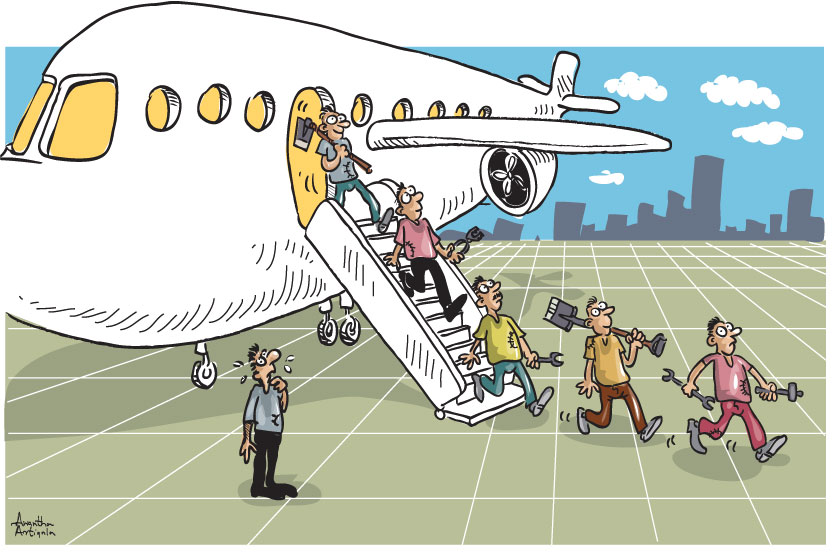
Statistics
Employment
According to the Labour Force Survey conducted in 2015 by the Department of Census and Statistics, the working age population considered as those aged 15 years and above. Before 2013 this was considered as age 10 years and above. The annual sampling size was 25,000 housing units since 2011. In 2015, 2500 Primary Sampling Units were allocated to each district and to the Urban, Rural and Estate sector. The survey results reveal that about 7.8 million people have been employed during the year 2015. Out of these employed persons 65.1% are males and 34.9% have been females. Out of the total employed population the highest share is reported under the services sector at 45.6% and the lowest is from the Industries sector at 25.8%. When looking at the distribution of employed population by major industry groups for each district, it has been found that the Gampaha District shows the highest share of employment in the industries sector at 38.8% and Kegalle District as the second highest at 33.2%.
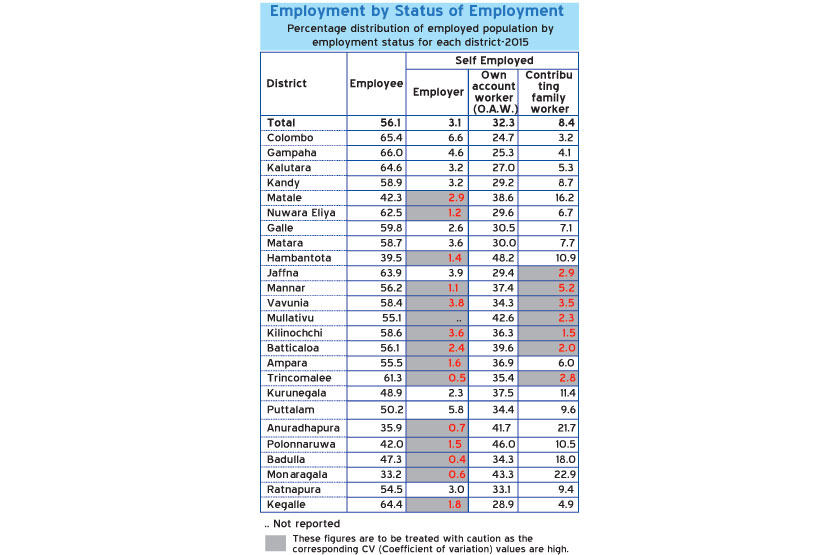
Another interesting find in this study was that there is an increasing trend in the share of employed persons with G.C.E O/L, G.C.E A/L, HNCE and other education levels as opposed to the group for grade five and below levels. As such the survey results indicate an increasing trend in level of education among the employed population of the country.
Unemployment
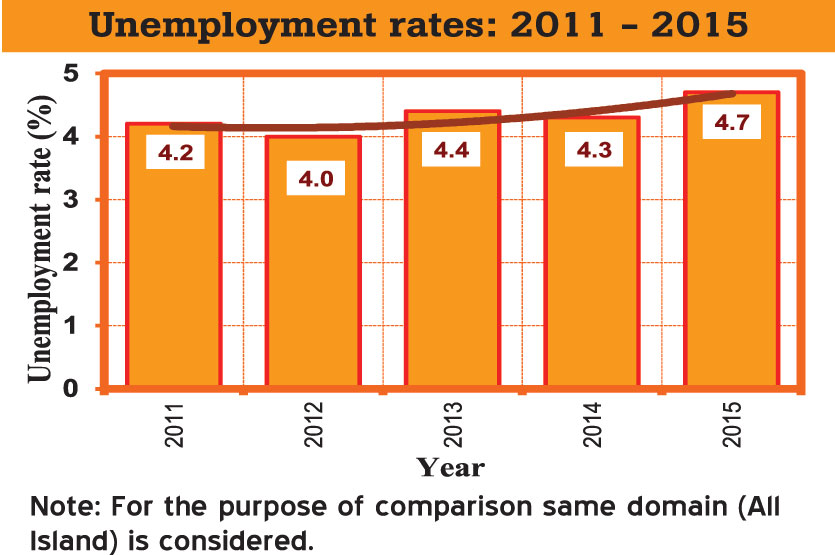
The survey identifies that unemployment is a key measure of economic health. Therefore it is a major factor in determining how healthy an economy is. An individual who is unemployed is both unproductive and is a drain on the society's resources. In Sri Lanka the number of unemployed persons is estimated at about 380,000 during 2015. Out of this total, 41.1% are males and 58.8% are females. Quite interestingly the unemployment rate among the higher educated group (G.C.E A/L and above) is reported to be 9.2%. This is 4.7% for males and 13.5% for females. Therefore this reveals that the problem of unemployment is more acute in the case of educated females than males.
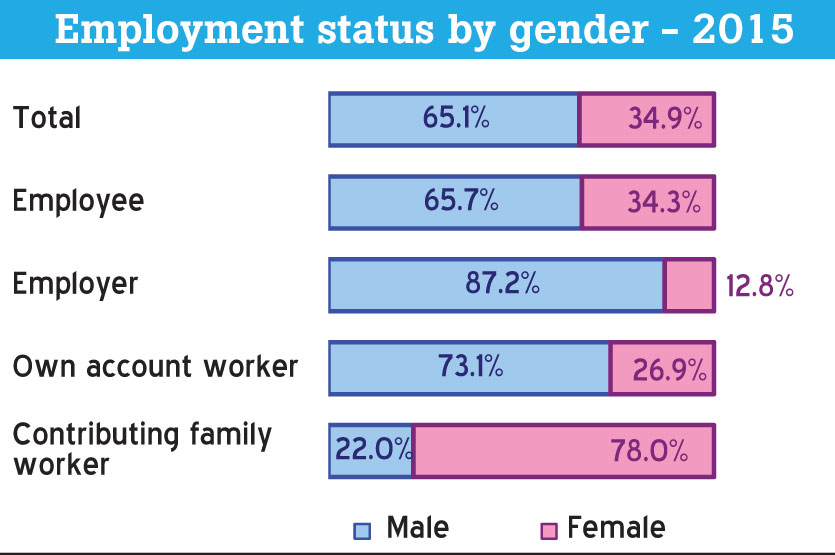
When looking at all age groups, female unemployment is higher. The majority among unemployed are the new entrants to the job market or new job seekers who are between 15-24 years. Hence, this is known as youth unemployment. It has been identified as a global trend since young people tend to wait till they get a suitable job.
Underemployment
According to the International Conference on Labour Statistics (ICLS) resolution (1966), underemployment exists when a person's employment is inadequate, in relation to specified norms or alternative employment while taking his or her occupational skills in to account. Underemployment could be characterised by Visible Underemployment which reflects in an insufficiency in the volume of employment or Invisible Underemployment which is characterised by low income, underutilisation of skill, low productivity and other factors.
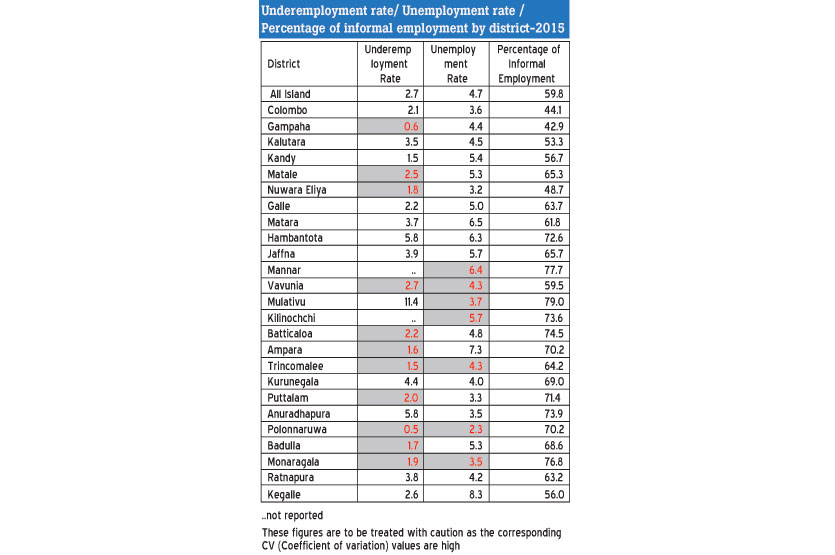
In Sri Lanka, the underemployment rates by economic sector reveal a significant difference. As such, the agriculture sector reveals the highest rate at 4.6% and the service sector reports the lowest at 1.6%. However it has also been found that underemployment decrease as the level of education increase. But the data shows that the underemployment rate for females is higher than that for males in every level of education. The highest underemployment rate was identified from the North Central Province.
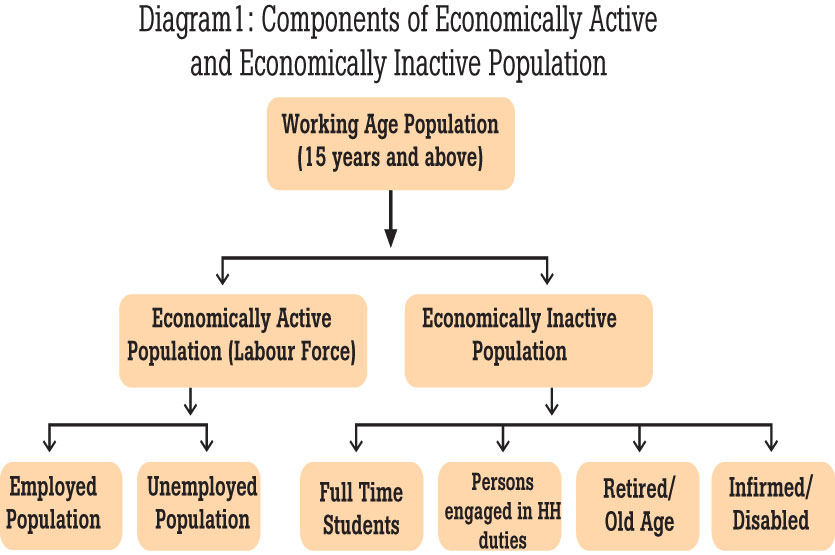
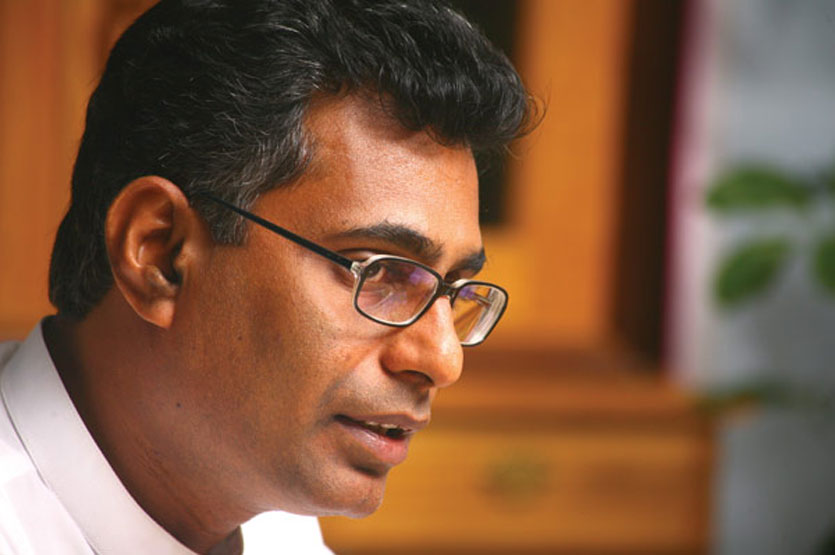
Sri Lankans are reluctant to work in certain fields: Patali Champika Ranawaka
Speaking to Life Online, Megapolis and Western Development Minister Patali Champika Ranawaka said that Sri Lanka has experienced a shortage of labour in the construction, agriculture and plantation sectors.
"Most of these foreign workers have on tourist visa and according to sources around 200,000 of them are currently working as labour. They are from South African, Pakistani, Indian, Maldivian and Bangladeshi origins. They come here mainly because of the low costs and they are categorized as cheap labour. Many security firms have recruited them and they are found everywhere in the country. On the other hand Sri Lankans are reluctant to work and most educated people are unemployed. If we increase the number of workers in the construction sector it will be quite beneficial to our economy."
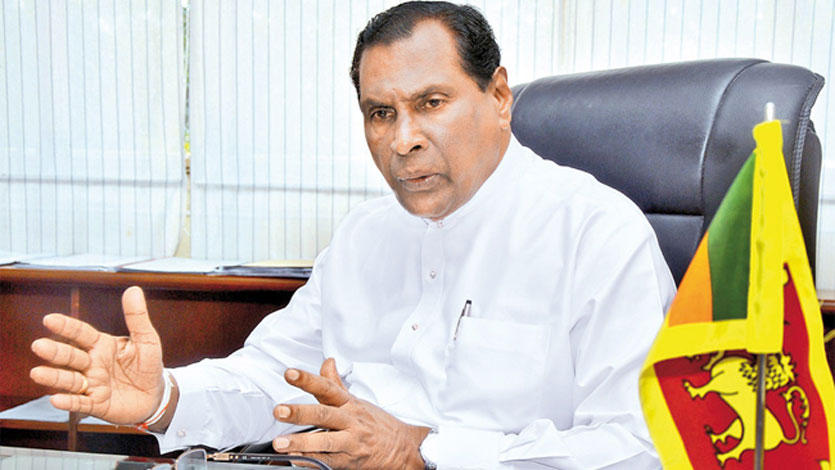
Need a proper methodology to recruit foreign workers: John Seneviratne
In his comments to Life Online, Minister of Labour and Labour Relations, John Seneviratne said that there should be some methodology brought forward when recruiting foreign workers.
"We are definitely experiencing a shortage of labour and there are ample opportunities available for these workers. This shortage of workers is a major drawback to the economy and therefore we need to keep filling this void in one way or the other. An individual labourer such as a mason or carpenter receives a minimum salary of Rs. 1500 per day. This number varies depending on the type of work they are doing. There are various ways in which the youth can get themselves occupied but they are not keen. In most instances the educated people don't like to work in these sectors. They are willing to take up posts in higher positions. So there is a void created in the lower levels. There are workers who come from outstation and if they could be recruited in these sectors they can earn a good amount to feed their families."
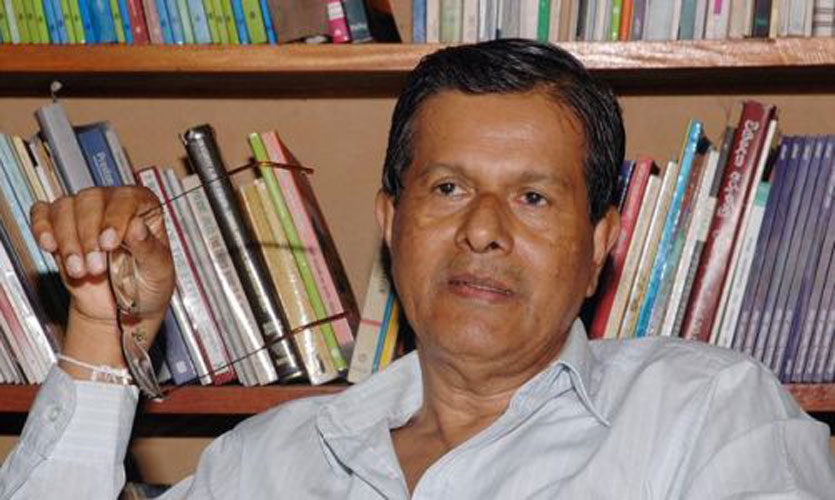
The Sri Lankan human resources sector has been completely neglected: Prof. Siri Hettige
According to senior professor of sociology, Professor Siri Hettige, many Sri Lankans go abroad to train themselves for various careers.
"In those countries they have to be quite competent. They can't be lethargic like how they are. I think it's important that we moderate a thorough investigation on why our people are lethargic. It is still an opinion that Sri Lankans are lethargic and therefore it would be good to conduct a study on different sectors and see why people are reluctant to work in those areas. We lack evidence-based facts. Instead we go behind people's opinions and this shouldn't be encouraged. Our unemployment rate is now less than 5% and it is relatively higher among women and educated people. We have totally neglected the human resources sector in our country. We talk about bringing in more investors and creating foreign employment and this is absolute lunacy. We do not realise what we are doing to our country at the end of the day. Human resource management is at its lowest level and that is the bigger picture we have failed to look at."
13 Comments
ed says:
May 18, 2017 at 04:46 amWhy can't we apply tax on all foreign workers who had come to the country to work ? If this is possible the ONLY way to collect is on their departure at the airport before entering the immigration. The airline boarding pass should be validated with the amount Tax paid and then the passenger could pass through immigration exit.
Adwani says:
May 23, 2017 at 09:49 pmWe have to pay them incentives for coming to sri lanka instead of taxing them, if they too feel reluctant to come, what are you going to do????????????????????????????
ED says:
May 18, 2017 at 05:00 amRegarding to Locals who are not taking the labor jobs in the country should be given an incentive specially a man or woman who has a family should be entitled for food stamps where they could spend at LAK SATHOSA ONLY. This has to be received at Pradesha Sabawa , validated by the Gramasevaka . This should be well recorded . Any shortcomings the responsible person should be fired immediately and inquiry to be conducted. If found guilty the person should be taken off the pension scheme. The government has to find a solution specially on the labor market towards the locals , then the money circulates within the country and contributes to the country's economy. If we get the foreigners coming then we are going to loose our foreign currency reserves.
Milla says:
May 18, 2017 at 05:14 pmSrilankans are generally a lazy bunch . No incentives can make them work . As long as Three wheelers are there why work for a living
Shakeel Mansoor says:
May 20, 2017 at 04:04 amFor once everyone is accepting the fact that Sri Lankans are lethargic and do not want to do low level jobs. Sri Lankans with just and OL/AL pass try to look for jobs which are comfortable or say white collar jobs. The problem is no one wants to work hard to earn an honest wage and rise in what ever career path they choose. Even if employed they tend to be lethargic at work and do not really contribute to the growth of any business but look for ways in making a quick buck. All business owners in Sri Lanka have worked hard to build them - sometimes from scratch, but no one wants to trust employees by allowing them to run the business as they know that they will end up being in a financial mess (e.g. fraud, stealing, laundering, etc.). This is prevalent all over the island. I am talking about the hospitality and F&B business sectors as I have experience of this area in Sri Lanka. Since most of the people in this sector are offered good incentives in the Middle East, they flock there once experience is gained for an year or two. Hence there is a big labor shortage to fill these vacancies. This void can only be filled by bringing in labor supply from neighboring countries - where in those countries they have to be very competitive to earn an honest wage.
Mary Thiagarajah says:
May 21, 2017 at 02:50 amIf Labour Jobs highly paid, many educated people may join. As a result of this labor standard will go up. This will be one of the greatest way to reduce the unemployment rate.
Chili says:
May 22, 2017 at 11:17 pmAs an employee at startup after 2 1/2 years in the hotel section, my experience is exactly as Milla and Shakeel Mansoor just explained, unfortunately. Still we are searching for good employers. Hardworking and loyal employers who help to lead the company to success. A successful company can pay better wages. The customer also pays for an extraordinary performance. But the cat bites itself in the tail, since the performance and above all the reliability of the staff is in no relation to it (experience, sad but true). Why did the English at that time have brought the Tamils as workers from India? And why foreign workers try to establish in Sri Lanka? A lot of people here try earning money without moving, often come with lie and cheating on the quick money. Hard and honest work is out of the question. Of course there are exceptions, unfortunately couldn't find them out yet... So do not be surprised if the aliens occupy the jobs.
Lalith says:
May 23, 2017 at 09:56 pmForeign workers are already filling certain jobs that are refused by native Sri Lankans. Few months ago, I visited a hotel in the South. The barmaid who served us was a Filipino. The Manager of the hotel told me that no Sri Lankan barmaid could be found so they had no choice.
realbuddhist says:
May 24, 2017 at 04:17 amLabor force specially in the agriculture sector is diminishing and we have to find labor to work on this sector, our youth are not keen to work on fields where in develop countries we find, even the owner of a large farm works himself/herself in par with the workers and all skilled labor draws more salary than white collar job holders. Even in SL these sector employees draw more wages but as the society does not recognize them in proper manner, Sri Lankan youth are reluctant to get in to these jobs, To find a solution for this, we have to adopt the Singapore system, where any employer could get such sector employees provided that it is being offered to locals and if could not find any then allowed to bring in labor they want, but pay a levy to the government with organize immigration on two year work pass. Why can not we adopt that.
NW says:
May 26, 2017 at 10:15 amAs Prof. Siri Hettige state we lack evidence-based facts, no one is will to do a proper study on this subject, rather we do complain regarding labour shortages. At any given time in majority of the apparel sector companies, which is know as a sector for female workers; operates with -10% of the expected labour cadre. At the same time in our ratios we talk about higher % of female unemployment. this also can be the mindset of our people, in general today majority wants easy money this is also a reason for educated people to be unemployed ... really good subject to have deeper look.
BANK EMPLOYEE says:
May 28, 2017 at 01:19 amIn Sri Lanka, most often than not, the loyal efficient worker is NOT rewarded; At promotions, the person with the gap often gets ahead. Furthermore, can you believe that pensionable permanent employees with over 25 years of service to a foreign employer could be 'locket-out' with the connivance of the Labour Department. Did you know that the Appeal Court and the Supreme Court both held in favour of the Foreign Employer depriving over 100 Sri Lankans their Right to Pension which was the practice since 1956 initiated as a result of a District Court Order under the Industrial Disputes Act?
Tilakaratne says:
May 28, 2017 at 09:15 amI need to say the problem of poor productivity of SL workers are not the fault of the workers but the poor quality of the managers. I worked in the middle east in a senior position and used to recruit from SL,the Sri Lankan workers were far better than any other nationality, we had staff from countries like South Korea and China as well when The SL are put in an environment where all work hard the SL do very well.as they came they found it difficult but with in a few months they out performed
Morrison says:
May 29, 2017 at 01:01 pmI totally agree with Prof., Hettige. Sri Lankans are lethargic, often lazy and have no idea what a full tiring day's work means. There of course people/Professionals who understand fully and have a completely hectic schedule of work quite the opposite. Many young women in this country have no career planned before they leave school, no opportunities, nothing to look forward to except marriage! A few women of course managed to work and have a career - which should be open to all who seek it. In the future I sincerely hope all young people will have opportunities, careers & a future to look forward to, then Sri Lanka can be proud of their young people.